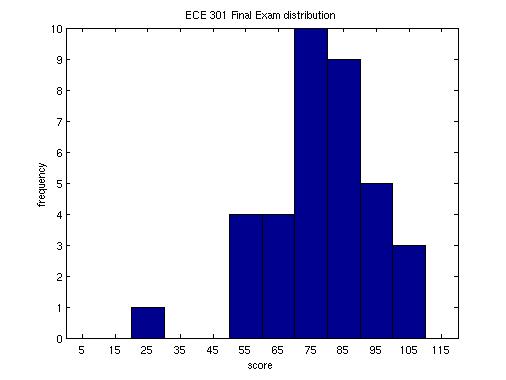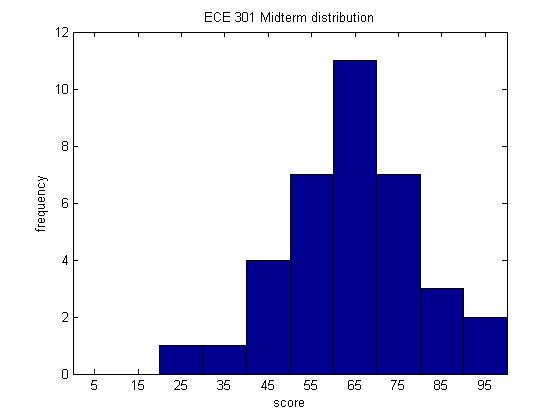| (27 intermediate revisions by the same user not shown) | |||
| Line 4: | Line 4: | ||
[http://web.ics.purdue.edu/~huffmalm/301SU09/Quiz2Soln.pdf Quiz 2 Solution]. Mean = 10.06 (out of 20), Standard Deviation = 5.14. | [http://web.ics.purdue.edu/~huffmalm/301SU09/Quiz2Soln.pdf Quiz 2 Solution]. Mean = 10.06 (out of 20), Standard Deviation = 5.14. | ||
| − | [http://web.ics.purdue.edu/~huffmalm/301SU09/Quiz3Soln.pdf Quiz 3 Solution]. | + | [http://web.ics.purdue.edu/~huffmalm/301SU09/Quiz3Soln.pdf Quiz 3 Solution]. Mean = 11.23 (out of 20), Standard Deviation = 3.96. |
| + | |||
| + | [http://web.ics.purdue.edu/~huffmalm/301SU09/Quiz4Soln.pdf Quiz 4 Solution]. Mean = 18.24 (out of 20), Standard Deviation = 2.28. | ||
| + | |||
| + | [http://web.ics.purdue.edu/~huffmalm/301SU09/Quiz5Soln.pdf Quiz 5 Solution]. Mean = 11.36 (out of 20), Standard Deviation = 6.28. | ||
| + | |||
| + | [http://web.ics.purdue.edu/~huffmalm/301SU09/Quiz6Soln.pdf Quiz 6 Solution]. Mean = 11.31 (out of 20), Standard Deviation = 4.24. | ||
| + | == Final == | ||
| + | '''[http://web.ics.purdue.edu/~huffmalm/301SU09/FinalSoln.pdf Final Solution]''' If you would like to pick up your graded Final, you may drop by Landis' office after August 9 (or send an email if he is out). | ||
| + | |||
| + | '''Final Results:''' Mean = 77.95 (out of 120), Standard Deviation = 17.52. | ||
| + | [[Image:FinalHistogram.jpg]] | ||
| + | |||
| + | '''Coverage:''' The exam will cover all material covered ''since'' the Midterm (including CT Fourier Transform). A list of topics include | ||
| + | * CT Fourier Transform | ||
| + | * CTFT properties and use of the tables (included on the exam) | ||
| + | * DT Fourier Transform | ||
| + | * DTFT properties and use of the tables (included on the exam) | ||
| + | * Differential/difference equations for DT/CT LTI systems computed via Fourier transform | ||
| + | * Nyquist Sampling Theorem/Sampling/Aliasing | ||
| + | * DT implementation of CT systems/filters | ||
| + | * AM modulation/demodulation; Single-sideband AM | ||
| + | * Laplace transform and ROC's | ||
| + | * Z transform and ROC's | ||
| + | |||
| + | '''Preparation:''' Reviewing the previous quizzes and homework are good ways to prepare. What I've assigned and quizzed on in the past suggests what I will emphasize on the exam. Also the practice exams below, given in past semesters by other instructors, will be good practice, though may not necessarily reflect our exam. | ||
| + | * [http://web.ics.purdue.edu/~huffmalm/301SU09/PracticeFinal1.pdf Practice Final 1] (no solutions) | ||
| + | * [http://web.ics.purdue.edu/~huffmalm/301SU09/PracticeFinal2.pdf Practice Final 2] (with [http://web.ics.purdue.edu/~huffmalm/301SU09/PracticeFinal2Soln.pdf solutions here]) | ||
| + | * [http://web.ics.purdue.edu/~huffmalm/301SU09/PracticeFinal3.pdf Practice Final 3] (with [http://web.ics.purdue.edu/~huffmalm/301SU09/PracticeFinal3Soln.pdf solutions here]) | ||
| + | |||
| + | == [[Final Cheat Sheet]] == | ||
| + | * A page dedicated to a collaborative cheat sheet. | ||
| + | |||
== Midterm == | == Midterm == | ||
| − | + | [http://web.ics.purdue.edu/~huffmalm/301SU09/MidtermSoln.pdf Midterm Solution] | |
| + | |||
| + | '''Midterm Results:''' Mean = 64.61 (out of 100), Standard Deviation = 15.31. | ||
| + | [[Image:MidtermHistogram.jpg]] | ||
'''Policy:''' No calculators are allowed on the exam, but you will be allowed one 8.5"x11" sheet (front and back) of ''hand-written'' notes. | '''Policy:''' No calculators are allowed on the exam, but you will be allowed one 8.5"x11" sheet (front and back) of ''hand-written'' notes. | ||
| Line 25: | Line 60: | ||
* [http://web.ics.purdue.edu/~huffmalm/301SU09/PracticeMidterm2.pdf Practice Midterm 2] (with solutions) | * [http://web.ics.purdue.edu/~huffmalm/301SU09/PracticeMidterm2.pdf Practice Midterm 2] (with solutions) | ||
* [http://web.ics.purdue.edu/~huffmalm/301SU09/PracticeMidterm3.pdf Practice Midterm 3] (with [http://web.ics.purdue.edu/~huffmalm/301SU09/PracticeMidterm3Soln.pdf solutions here]) | * [http://web.ics.purdue.edu/~huffmalm/301SU09/PracticeMidterm3.pdf Practice Midterm 3] (with [http://web.ics.purdue.edu/~huffmalm/301SU09/PracticeMidterm3Soln.pdf solutions here]) | ||
| + | |||
| + | |||
| + | == [[Midterm Cheat Sheet]] == | ||
| + | * A page dedicated to a collaborative cheat sheet. | ||
[https://kiwi.ecn.purdue.edu/rhea/index.php/ECE301_(HuffmalmSummer2009) Return to main] | [https://kiwi.ecn.purdue.edu/rhea/index.php/ECE301_(HuffmalmSummer2009) Return to main] | ||
Latest revision as of 11:55, 6 August 2009
Quiz Solutions
Quiz 1 Solution. Mean = 13.00 (out of 20), Standard Deviation = 4.62.
Quiz 2 Solution. Mean = 10.06 (out of 20), Standard Deviation = 5.14.
Quiz 3 Solution. Mean = 11.23 (out of 20), Standard Deviation = 3.96.
Quiz 4 Solution. Mean = 18.24 (out of 20), Standard Deviation = 2.28.
Quiz 5 Solution. Mean = 11.36 (out of 20), Standard Deviation = 6.28.
Quiz 6 Solution. Mean = 11.31 (out of 20), Standard Deviation = 4.24.
Final
Final Solution If you would like to pick up your graded Final, you may drop by Landis' office after August 9 (or send an email if he is out).
Final Results: Mean = 77.95 (out of 120), Standard Deviation = 17.52.

Coverage: The exam will cover all material covered since the Midterm (including CT Fourier Transform). A list of topics include
- CT Fourier Transform
- CTFT properties and use of the tables (included on the exam)
- DT Fourier Transform
- DTFT properties and use of the tables (included on the exam)
- Differential/difference equations for DT/CT LTI systems computed via Fourier transform
- Nyquist Sampling Theorem/Sampling/Aliasing
- DT implementation of CT systems/filters
- AM modulation/demodulation; Single-sideband AM
- Laplace transform and ROC's
- Z transform and ROC's
Preparation: Reviewing the previous quizzes and homework are good ways to prepare. What I've assigned and quizzed on in the past suggests what I will emphasize on the exam. Also the practice exams below, given in past semesters by other instructors, will be good practice, though may not necessarily reflect our exam.
- Practice Final 1 (no solutions)
- Practice Final 2 (with solutions here)
- Practice Final 3 (with solutions here)
Final Cheat Sheet
- A page dedicated to a collaborative cheat sheet.
Midterm
Midterm Results: Mean = 64.61 (out of 100), Standard Deviation = 15.31.

Policy: No calculators are allowed on the exam, but you will be allowed one 8.5"x11" sheet (front and back) of hand-written notes.
Coverage: The exam will cover all material through lecture on Wednesday, July 8. Thursday and Friday's lecture will review exam material. The topics include
- Signal properties (even/odd, periodicity, power, energy, etc.)
- Independent variable operations (time shift/scaling/reversal, etc.)
- System properties (Memoryless, causality, time-invariance, linearity, stability, invertibility)
- Finding System properties of LTI systems from properties of the impulse response
- DT and CT LTI system input/output relationship by convolution
- Differential/difference equations to describe LTI systems
- Fourier series of DT and CT periodic signals and Fourier series properties
- Fourier series of output of an LTI system
- Continuous Time Fourier transform (CTFT) and CTFT properties
Preparation: Reviewing the previous quizzes and homework are good ways to prepare. What I've assigned and quizzed on in the past suggests what I will emphasize on the exam. Also the practice exams below, given in past semesters by other instructors, will be good practice, though may not necessarily reflect our exam.
- Practice Midterm 1 (no solutions)
- Practice Midterm 2 (with solutions)
- Practice Midterm 3 (with solutions here)
Midterm Cheat Sheet
- A page dedicated to a collaborative cheat sheet.

